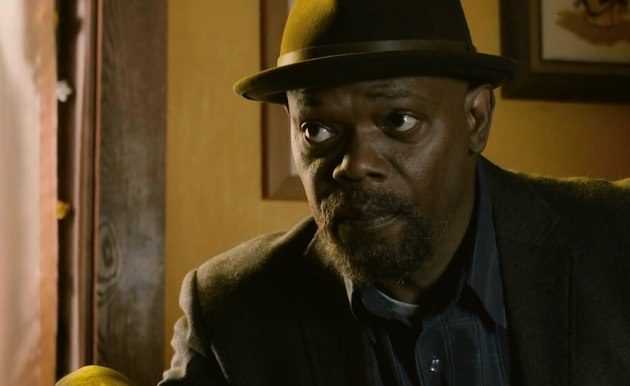REVIEW: Samuel L. Jackson Makes an Unconvincing Con Man in The Samaritan

A former grifter gets out of prison after serving 25 years for killing his partner in The Samaritan, and in a tale as old as time (or at least as old as the movies), tries to go straight, only to get pulled in for one last job. His name is Foley, and he's played by Samuel L. Jackson, and this film from Canadian director David Weaver is svelte enough in its reassembling of familiar elements to be, for a while, as comfortably pleasant as sipping on what once used to be your go-to drink — until The Samaritan takes a jarring turn right out of Park Chan-wook, and from there takes a tumble into ludicrousness from which it doesn't recover.
The opening, at least, is stagey but solid. Foley is world-weary and jaded, and leaves prison expecting and getting nothing from the outside. Everyone he knows is either dead or would rather not be reminded of the past he represents, and any money he lent out is long gone. Foley is left to rattle around the Toronto he no longer knows, a city portrayed with self-conscious chiaroscuro to emphasize the story's noir qualities. The only person interested in Foley is Ethan (Luke Kirby), the son of his old partner and a real piece of work. He has a grift and he has a target in mind — the dangerous but wealthy Xavier (Tom Wilkinson) — and while Foley wants nothing to do with the kid (who initially claims no resentment for what happened to his dad), Ethan keeps after him, taking him out for a drink and dropping a girl, Iris (Ruth Negga), into his lap like it's another option on offer at the bar.
Negga's an interesting actress — her most prominent role to reach US screens so far has been as the best friend of the protagonist in Neil Jordan's Breakfast on Pluto, and here she gets a solid showcase for her very modern, Asia Argento-ish fierceness. Iris is both femme fatale and gamine in need of rescue, the product of an unhappy orphaned upbringing, a smack addict bearing scars from suicide attempts. She pursues Foley with a single-mindedness that he seems to find quietly alarming, and not just because he has his doubts about her motivations — she wields her disastrousness like a club, as if inviting victimization were part of her appeal, as though being self-aware were enough to address her many problems. The relationship that develops between her and Foley doesn't crackle with chemistry and gets partially smooshed into a montage, but it does have some edgily interesting moments, as when he tells her she doesn't need to shut the door when she goes into the bathroom to shoot up, and keeps her company when she does it.
Being a con man is so much more a movie profession than any kind of tangibly real-life one that to say someone is unconvincing at it feels a little silly. But Foley just doesn't make a believable grifter. He's meant to have once been legendary (Ethan says he was the "best in the city, according to a lot of the old timers"), though we don't see those days other than in a brief flashback to the murder. In the present, Samuel L. Jackson is so intrinsically Samuel L. Jackson that the idea of his slipping into a role to loosen someone of his or her cash is amusing — he makes a believable tough guy when he beats someone up in the bathroom of a dive bar, but he doesn't give off the air of a smooth talker. When we do finally get Foley in action, his technique seems to be acting badly, woodenly talking about offshore accounts in a way that blatantly signals he's here to gyp his target out of something despite his earlier advice that the trick of the game is that "the mark gets to act like he's doing me a favor."
Jackson doesn't so much act as appear in films these days, and while he does some initial modulating of his on-screen persona for the role of Foley, it starts to fall away — the way he delivers the line "Rip that shit off this wall and throw it away!" is so close to the rhythms of "Yes, they deserved to die and I hope they burn in hell!" it's worthy of a giggle. But he makes a good former convict because he seems too together to wallow in the fact that the world has passed him by. As a mood piece, at least, the film's introduction is mournfully interesting. The Samaritan is best when it's letting Foley drink alone at his shadowy, empty bar of choice after the bartender has asked permission to ignore him and watch the hockey game, as he tries to decide whether or not to join the girl in the corner, a girl who's promising trouble but also redemption.
Follow Alison Willmore on Twitter.
Follow Movieline on Twitter.
